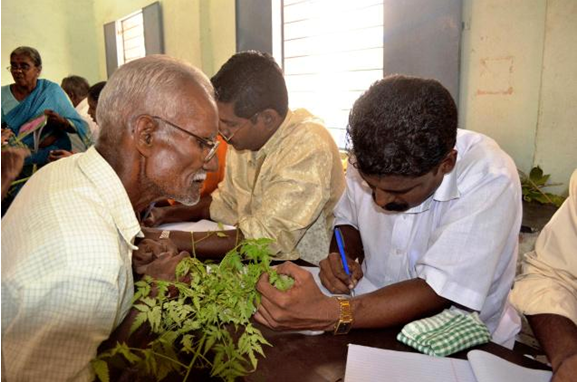| Plant clinic for diagnosing pests and infestations |
 |
|
For details please contact: |
| |
Name |
: |
Ms. Nancy J Anabel |
| |
Designation |
: |
Director |
| |
Address |
: |
Information and Communications, MSSRF, III Cross Street, Institutional Area, Taramani, Chennai 600 113 |
| |
Mobile |
: |
9444391467 |
| |
Phone |
: |
9445002060 |
| |
email |
: |
anabel@mssrf.res.in |
| |
|
The M. S. Swaminathan Research Foundation (MSSRF) along with an international organisation called CABI jointly piloted a project called plant clinic (PC) in Tamil Nadu, Puducherry and Maharashtra through the institute’s Village Resource Centres located in the regions.
The main aim of setting up such clinics is to diagnose pests and diseases in any crop and render accurate knowledge to the farming community. Basically it is a community-driven model, conducted in a common location, accessible to all categories of farmers in a village.
Need guidance
Farmers need guidance to distinguish the difference between pest and infestations, understand harmful effects of red labelled/banned pesticides, pest resurgence, resistance to pesticides etc.
“The clinic provides an array of technological solutions along with cultural, biological and chemical methods, which are nationally and internationally permissible, ecologically safe and environmentally sustainable for mitigating crop loss and enhancing plant health and economic benefit,” says Ms. Nancy J Anabel, Director, Information and Communications of the Institute.
The clinics are conducted fortnightly and do not cost any money according to her. Persons with agricultural background are chosen and trained by CABI as plant doctors to diagnose the issue and provide appropriate solutions. However, MSSRF encourages progressive farmers, who are reservoirs of pragmatic knowledge and traditional wisdom to be trained and enrolled in this.
A tool kit encompassing lens, microscope, laptop, projector, knife, gloves, tissue and sanitisers along with required templates to collect case history and issue prescriptions are given.
Prescription
Farmers bring their affected crop samples to the clinics to recognise the problem and get technological solutions. Every farmer is provided with a prescription, detailing the case history along with recommendations. The PC treats the crop samples with the help of the comprehensive factsheets in the local vernacular brought by the farmers.
As farmers are hungry for information regarding their crop details the role of this plant clinic is more important to help offer appropriate knowledge to them to grow healthy crops which in turn generate better revenue.
Presently about 37 plant doctors serve through 14 Plant clinics; 391 clinic sessions have been conducted till now across Tamil Nadu, Puducherry and Maharashtra, spanning 62 villages, in which more than 6,000 farmers including 992 women farmers have been reached.
Recently about 46 farmers from Varagoor village, Thanjavur District brought crop samples to the clinic and found them to be affected by rice blast. After examining the tillers, the plant doctors recommended the right type of spray to be used. Timely application helped them save their crop with additional yield of 5.9 tons in 100 acre.
Case study
Take the case of another woman farmer, Ms. Dhanalakshmi from Pudukuppam, Puducherry, who chose agriculture as a profession, a few years back, struggled due to her no knowledge about the subject and discouragement from others.
“I was confused. I didn’t know whether I had taken the right decision. Thanks to this plant clinic concept I am able to diagnose and spot the pest and infestations if any on my paddy, plantain and mango crops,” she says.
Mr. Arunachalam, Pasupathikovil village in Thanjavur district realized an additional yield of 60 kg / half acre in Gingili crop by preventing 30 per cent yield loss from Jassids and wilt disease attack, when the rest of his fellow farmers realized a mediocre 250 kg /acre.
Another beneficiary
Similarly Mr. Gajanan Shyamraoji Wankhede, in Papal village in Amravati, Maharashtra could address leaf curling infestation in his capsicum and stem borer in his brinjal crop through one of the clinics in his region.
“We welcome farmers across the country to contact us for details on this and are ready to address their queries. If need be, more clinics like this can also be established in other parts of the country as well,” says Ms. Nancy.
|

